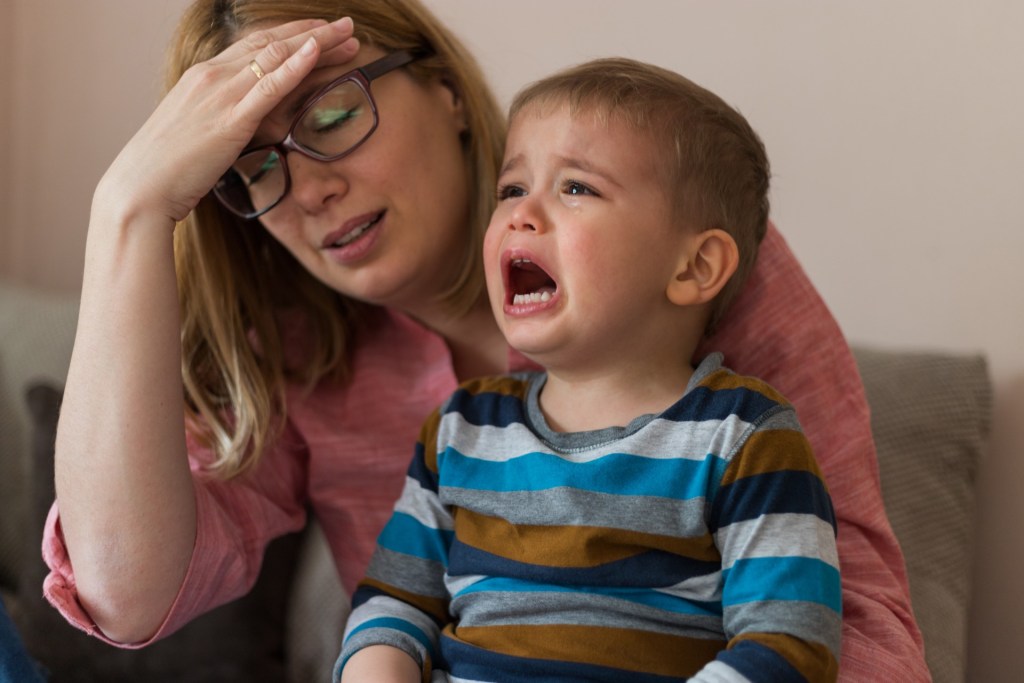Whether you call them the terrible twos, three-nagers, or any other clever name, the fact is that toddlers are a hot mess sometimes. If the thought of a public tantrum scares you to death, you’re not alone. But, like all things in life with kids, there are ways to prevent and handle these inevitable meltdowns. A little prep work and a lot of love are all it takes to help your child feel better. So, when your little angel turns into a scary villain — and they will — our tried-and-tested tips will help you handle the situation like a pro.
The struggle is real

Once babies get in a feeding and sleeping routine, they’re easier for new parents to handle. But just when you think you’ve got a hold of this whole parenting thing, someone pulls the rug from under your feet, and you have a toddler on your hands.
If this sounds familiar to you, it’s because all parents go through the same thing. The most important thing to keep in mind is that your child is not trying to be difficult. The reality is that things are simply challenging for toddlers.
Around the age of 2, young children start to experience new emotions, and they don’t know how to handle them. The best thing you can do as a parent is set your ego aside. Exercise empathy, and always remember that the toddler’s struggle is as difficult for them as it is for you.
Frequent tantrum situations
No one knows your child better than you do. And at this point, you’ve probably already identified your baby’s triggers. A good rule of thumb is to keep these challenging situations in mind before you go into them. This doesn’t mean you need to avoid those settings altogether; it just means you should go into them knowing that things might get dicey at some point. Here are some common triggers that may leave you with a crying tot on your hands:
- Saying goodbye at playdates.
- Long trips to the store.
- Being with large groups of people.
- Leaving daycare.
- Driving back home after a fun-filled event.
How to prevent a tantrum before it happens

Prevention is the ideal way to handle a tantrum. If you notice a pattern of situations that sets your child off, be proactive to avoid the outbursts before they happen. You’re not doing this because you’re afraid of your child, but because there’s no need to put them and yourself through unnecessary drama.
These are some easy steps to take before you leave home to avoid a temper tantrum in public:
- Make sure your child is well-fed and well-rested.
- Keep healthy snacks and water with you.
- Pack some toys to keep your toddler entertained.
- Go over the schedule with your child so they know what will happen.
- Give them a job while you’re out and about.
- Set expectations for behavior and establish ground rules.
How to handle a tantrum once it happens
Sometimes, no matter what you do, your child will get fussy and throw a tantrum. Keep in mind that this is not a reflection of your parenting skills, and it doesn’t mean that there’s anything wrong with your kid, either.
If and when a tantrum happens while you’re out in public, keep your cool and remember the following tips:
- Stay calm and in control.
- Take your child by the hand and remove them from the situation that’s causing the tantrum.
- Take your child to a safe place.
- If your child is on the floor, pick them up if necessary.
- Get down to your child’s level and remind them of your expectations.
- Ask yourself why the tantrum is happening and if there’s anything you can do to end it.
- Be present and patient.
- Avoid saying too much.
- Hold them close and let them feel loved.
- Acknowledge your child’s feelings.
- Show understanding and empathy.
- If appropriate, distract your child.
- Once your child is calm, give them clear instructions on what will happen next.
What not to do

Tantrums are a true test of your patience as a parent. To make things easier on you, avoid the following at all costs:
- Don’t let the frustration blind you or cause you to lose control.
- Don’t worry about what others are thinking.
- Don’t embarrass or punish your child in public.
- Don’t give in to bribes, promises, or begging.
- Don’t rush things.
If you’re worried that your child’s tantrums are excessive, talk to your pediatrician. They’re always the best resource to determine if your little one needs professional help.
In most cases, however, it’s just a stage. When dealing with a headstrong toddler, it’s important to remember that you’re a mature adult. When you react with love and empathy, you teach your child how to relax and handle a difficult situation. This is the best way to put an end to unnecessary outbursts and raise an emotionally intelligent child.
Editors' Recommendations
- Heads up, 7 up: What’s the game and how to play it
- How much water should a 1-year-old drink? What you need to know
- Why do toddlers hit themselves? The reasons may surprise you
- How to relieve constipation in your toddler safely
- How old do you have to be to fly alone? Read this before booking your kid’s trip


